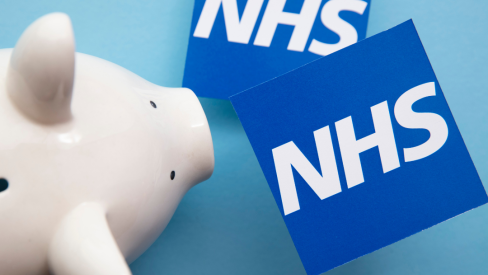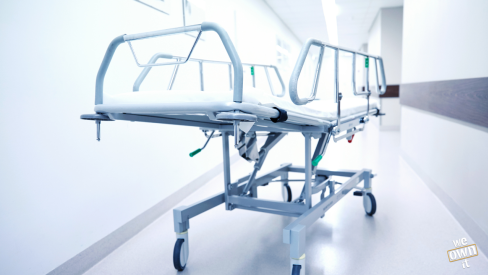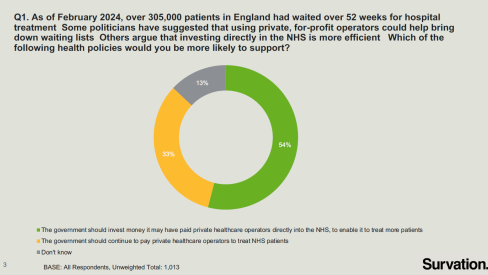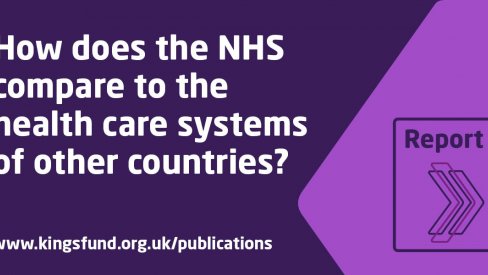ANALYSIS: The NHS has lost £10 million-a-week to private profits since 2012
£6.7 billion, or £10 million each week, has left the NHS’s budget in the form of private profits on all private contracts given by the NHS from January 2012 to May 2024, according to a new analysis.
This finding is based on an analysis of NHS contracts data supplied to public ownership campaign organisation We Own It by public sector contracts specialists, Tussell, involving up to 72,258 contracts worth a total of £130.7 billion.
Looking specifically at outsourcing contracts for services that the NHS can and does already deliver in many places, We Own It analysis shows that £5.2 billion out of the £6.7 billion total profits have left the NHS on contracts given over the relevant period.[1]
Analysis:
Because of the massive number of contracts involved, we chose a statistically representative portion to analyse and then apply the findings to the total of contracts.
We chose all contracts over the value of £1 million:
- These made up 12.5% of the total number of contracts - 9093/72258
- But 94% of the total value of contracts (in £ terms) - £123.1 billion/£130.7 billion
Tussell’s dataset includes profit estimates for the vast majority of the 72,258 contracts. They use Moody’s market analysis tool, Bureau van Dijk (BvD), to extract their profit estimates.[2]
Tussell data indicates that the average contract worth over £1 million had an average estimated profit margin of 5.18%.
We then applied this estimated profit margin to the totality (in terms of value) of contracts given out by the NHS at national, regional and local levels since January 2012. We applied an estimated profit margin of 5.18% to £130.7 billion.
Profits removed from all private/outsourcing contracts given out by the NHS between January 2012 and May 2024 are estimated to be £6.7 billion.
- Or £558 million each year
- Or £45 million each month (£44.9 million to be exact)
- Or £10 million a week (£10.3 million to be exact)
The above figure incorporates the NHS in England, Scotland, Wales and Northern Ireland. The NHS in all the nations are funded through a grant from the UK government.
Total amounts that have left the NHS in profits from outsourcing contracts given by each non-English nation between January 2012 and May 2024:
- Scotland - £374.3 million
- Wales - £282.4 million
- Northern Ireland - £90.2 million
The cost of NHS privatisation - for individual party pledges:
Below is a partial list of how each of the main parties could factor in savings from ending NHS privatisation into the costing for their manifesto policies:
1. It can cover the Liberal Democrat's £4 billion plan to give cancer patients the legal right to start treatment within two months of referral and still have £2.7 billion left.[3]
2. It can more than triple Labour's £2 billion plan to create 40,000 new GP appointments per week, 700,000 new dentist appointments per year and double the NHS's diagnostic capacity.[4]
3. It can cover the cost of the Conservative £1 billion-per-year plan to build 100 GP surgeries per year in England, for almost 7 years.[5]
4. It would cover the cost of the Royal College of Nurses proposed student loan forgiveness for NHS nurses for up to 28 years.[6]
5. Given the Labour manifesto has committed to continuing the Conservatives' 40 new hospitals project, the amount that has left the NHS in profits since 2012 would cover the cost of building 10 of those new hospitals.[7]
End Notes:
- NHS private contracts fall under a number of categories, such as contracts for “works”, “products”, “supplies”, “services”, “not applicable” and “not specified”. The £6.7 billion profits figure applies to all contracts across all these categories. The more specific £5.2 billion profits figure applies to just “services”, which tend to be for things like surgeries, tests, catering, cleaning, etc contracts. The NHS does these things in some parts, which means the NHS can provide those services by itself if they decided to bring those contracts back in house.
- It should be said that Moody’s BvD provides an estimate of the profit margins of companies as a whole, but Tussell (and we) make the assumption that there is a strong similarity between a company’s profit margins on all revenue and their profit margin on revenue from one particular source, such as an NHS contract.
- https://www.libdems.org.uk/news/article/ed-davey-calls-for-two-month-cancer-treatment-guarantee
- https://www.bbc.co.uk/news/uk-politics-67043218
- https://www.bbc.co.uk/news/articles/cv2289vk0n1o#:~:text=The%20Conservatives%20have%20promised%20to,people%20seeing%20their%20GP%20first.
- https://x.com/theRCN/status/1763179724543541390/photo/2
- https://www.hsj.co.uk/finance-and-efficiency/40-new-hospitals-programme-is-4bn-short-say-officials/7036828.article
Background:
The Health and Social Care Act, which passed in 2012 was the most radical reorganisation of the NHS since its founding - at least until the recent reorganisation brought on by the Health and Care Act 2022.
The 2012 Act, among other things, opened the door to privatisation in at least two ways:
First, it repealed the Health Secretary’s legal duty to provide health services to everyone in England. This role has historically been interpreted to give the secretary of state a duty to provide for the facilities, equipment and personnel needed to meet the health needs of the population. It had served as a limited bulwark against privatisation.
The Act instead passed a much-weakened version of this duty to local NHS bodies called Clinical Commissioning Groups (CCGs); it gave them the duty to “arrange for the provision” of health services.
The second way was the introduction of Section 75. Section 75 of the 2012 Act made it mandatory for CCGs to tender for all services over a set value, inviting all qualified providers, including private companies to apply to run it. This exploded outsourcing in the NHS.
According to Prof Pollock and Roderick, “In the first year after the Act's implementation, one-third of NHS contracts were awarded to the private sector.”
Section 75 has been repealed by the recent Health and Care Act 2022, but the latest reorganisation, which changed Clinical Commissioning Groups to Integrated Care Systems, has left it open for private companies to sit on the boards of Integrated Care Systems. We Own It has campaigned to ban private companies on these boards.
Privatisation is not only bad because it sucks much-needed funds out into private shareholder pockets. It is also bad because it leads to poorer quality health services.
For example, a March 2024 review by the University of Oxford shows that outsourcing in healthcare leads to worse care for patients. (source)
Additionally, in their April 2024 report, the BMJ’s Commission on the Future of the NHS (under the subheading of “food”), identifies outsourcing in areas like NHS catering as leading to poorer health outcomes. (source)
Peer-reviewed academic research also shows that hospitals cleaned by private companies are dirtier and spread more hospital-acquired infections than those cleaned by in-house NHS staff. (source)













